The Intel Core i9-9980XE CPU Review: Refresh Until it Hertz
by Ian Cutress on November 13, 2018 9:00 AM ESTHEDT Performance: Office Tests
The Office test suite is designed to focus around more industry standard tests that focus on office workflows, system meetings, some synthetics, but we also bundle compiler performance in with this section. For users that have to evaluate hardware in general, these are usually the benchmarks that most consider.
All of our benchmark results can also be found in our benchmark engine, Bench.
PCMark 10: Industry Standard System Profiler
Futuremark, now known as UL, has developed benchmarks that have become industry standards for around two decades. The latest complete system test suite is PCMark 10, upgrading over PCMark 8 with updated tests and more OpenCL invested into use cases such as video streaming.
PCMark splits its scores into about 14 different areas, including application startup, web, spreadsheets, photo editing, rendering, video conferencing, and physics. We post all of these numbers in our benchmark database, Bench, however the key metric for the review is the overall score.
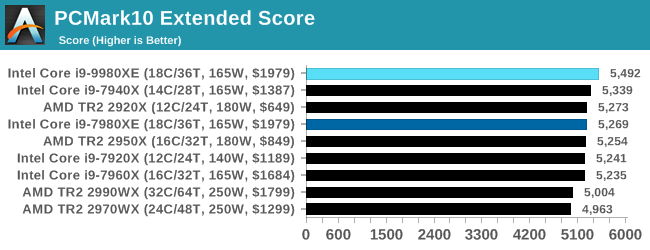
A small bump in the result here because of the added core frequency.
Chromium Compile: Windows VC++ Compile of Chrome 56
A large number of AnandTech readers are software engineers, looking at how the hardware they use performs. While compiling a Linux kernel is ‘standard’ for the reviewers who often compile, our test is a little more varied – we are using the windows instructions to compile Chrome, specifically a Chrome 56 build from March 2017, as that was when we built the test. Google quite handily gives instructions on how to compile with Windows, along with a 400k file download for the repo.
In our test, using Google’s instructions, we use the MSVC compiler and ninja developer tools to manage the compile. As you may expect, the benchmark is variably threaded, with a mix of DRAM requirements that benefit from faster caches. Data procured in our test is the time taken for the compile, which we convert into compiles per day.
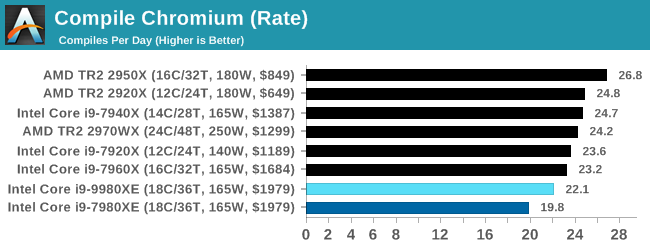
For the compile test, the 9980XE brings the 18-core up to being more competitive, however this test does seem to prefer fewer cores, lower crosstalk, and higher frequencies. AMD's 16-core TR2 wins here, adding 20% perf over the 9980XE for under half the cost.
3DMark Physics: In-Game Physics Compute
Alongside PCMark is 3DMark, Futuremark’s (UL’s) gaming test suite. Each gaming tests consists of one or two GPU heavy scenes, along with a physics test that is indicative of when the test was written and the platform it is aimed at. The main overriding tests, in order of complexity, are Ice Storm, Cloud Gate, Sky Diver, Fire Strike, and Time Spy.
Some of the subtests offer variants, such as Ice Storm Unlimited, which is aimed at mobile platforms with an off-screen rendering, or Fire Strike Ultra which is aimed at high-end 4K systems with lots of the added features turned on. Time Spy also currently has an AVX-512 mode (which we may be using in the future).
For our tests, we report in Bench the results from every physics test, but for the sake of the review we keep it to the most demanding of each scene: Cloud Gate, Sky Diver, Fire Strike Ultra, and Time Spy.
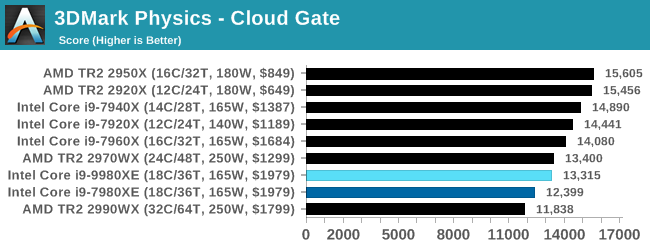
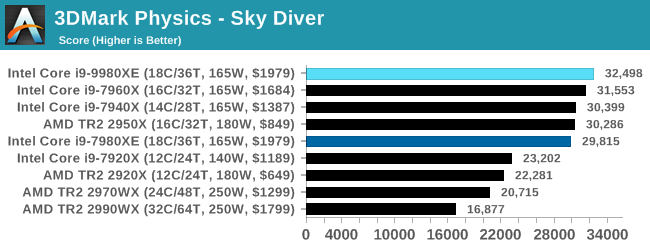
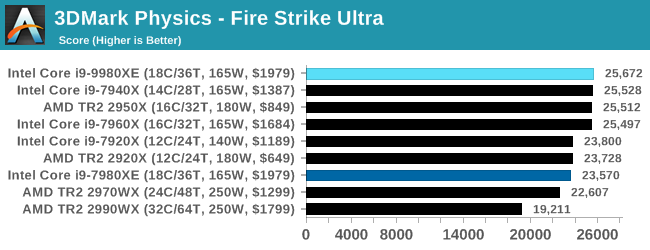
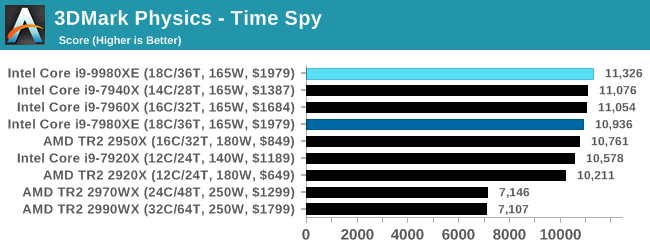
The newer engines can take advantage of the higher core count parts, and Intel's unified memory design also helps here.
GeekBench4: Synthetics
A common tool for cross-platform testing between mobile, PC, and Mac, GeekBench 4 is an ultimate exercise in synthetic testing across a range of algorithms looking for peak throughput. Tests include encryption, compression, fast Fourier transform, memory operations, n-body physics, matrix operations, histogram manipulation, and HTML parsing.
I’m including this test due to popular demand, although the results do come across as overly synthetic, and a lot of users often put a lot of weight behind the test due to the fact that it is compiled across different platforms (although with different compilers).
We record the main subtest scores (Crypto, Integer, Floating Point, Memory) in our benchmark database, but for the review we post the overall single and multi-threaded results.
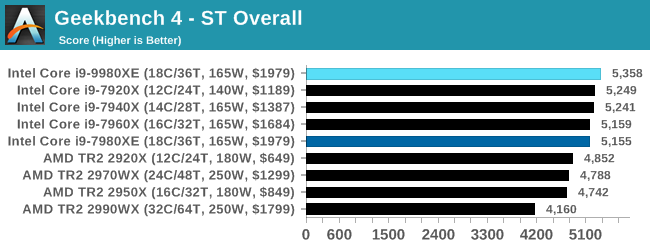
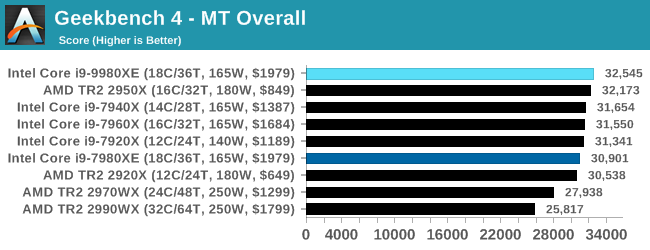










143 Comments
View All Comments
nexuspie - Tuesday, November 13, 2018 - link
Marketing doesn't work in tech. Tech buyers aren't dumb. People want performance, and today that's Intel by far. On a per-core basis it creams the competitor.Arbie - Tuesday, November 13, 2018 - link
Ironically stated in pure marketing-speak.Tech buyers know that shouting "performance" is meaningless out of context - and that includes a lot more than clock speed. For example price, power, cooling, cores, threading, features, platform, socket life... the list goes on. All conveniently ignored in a slogan like yours, which could have come from an Intel ad.
Spunjji - Tuesday, November 13, 2018 - link
He's dropping classic lines from the "I am an empowered, smart individual and marketing doesn't work on me" playbook. I find it's usually a line trotted out by people on whom marketing works absolute miracles.Kilnk - Tuesday, November 13, 2018 - link
I've been reading your comments and I love your style.Arbie - Tuesday, November 13, 2018 - link
"there’s no point advertising a magical 28-core 5 GHz CPU ... if only one in a million hits that value."Sure there is: to confuse the market and draw attention away from the competition. As at Computex in June.
twtech - Thursday, November 15, 2018 - link
How about 4.5 GHz?eva02langley - Tuesday, November 13, 2018 - link
So many refreshes, and so little supply on the shelves.jospoortvliet - Friday, November 16, 2018 - link
Takes only 9 weeks to be delivered I suppose? And that is just the promise - delays likely.Cooe - Tuesday, November 13, 2018 - link
Rofl, and the second you look at the price tags, anyone with half a piece of common sense would realize that buying an i9-9980XE over a TR-2950X is absolutely freaking ridiculous! (Unless you simply NEED AVX-512 that is). Intel's flailing with Skylake.... again..., while AMD's near finished changing the game entirely with 7nm Zen 2, and it's all honestly pretty damn hilarious. Karma's a b**ch and all that lol.benedict - Tuesday, November 13, 2018 - link
Agreed, the 2950X offers the best value in the HEDT segment.